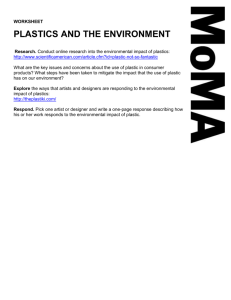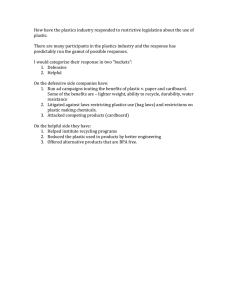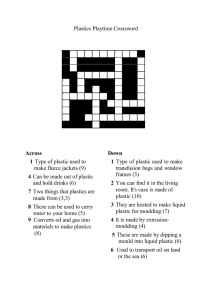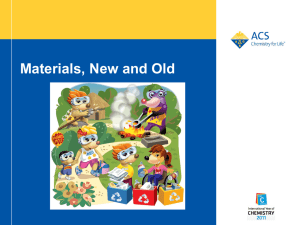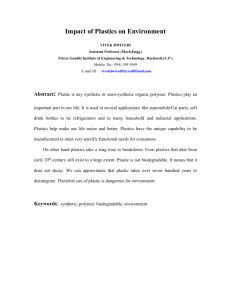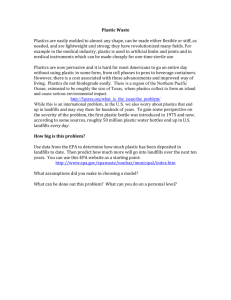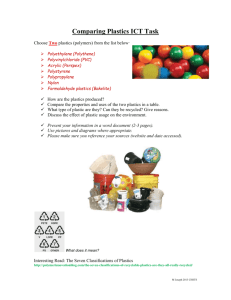Click to edit Master title style waste plastics into profit 1
advertisement
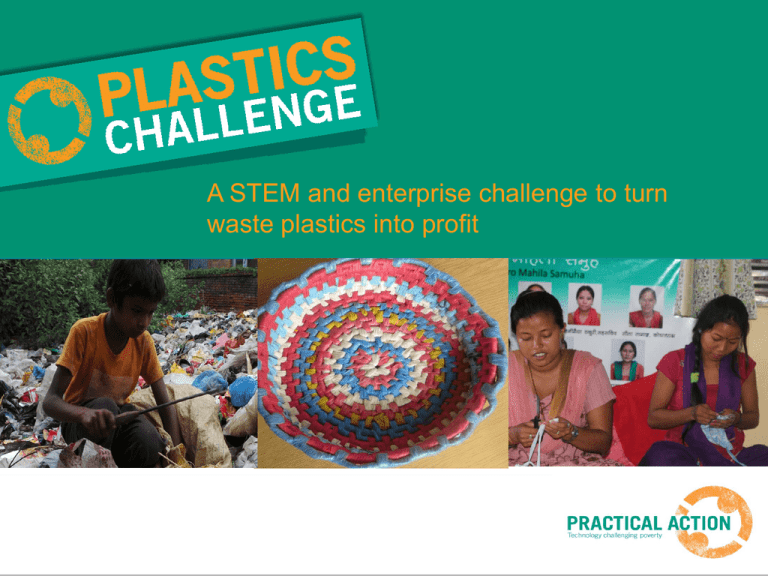
Click to edit Master title style A STEM and enterprise challenge to turn waste plastics into profit 1 WHAT DO YOU SEE? Spend a few minutes looking at the photographs and in your groups discuss the following questions: What do you see? What does it make you think about? Are there any problems that you can identify? And finally… What questions do the photographs raise for you? RUBBISH FACTS… IN THE UK The average household produces more than a tonne of waste every year Some plastic can take up to 500 years to decompose We produce 5 million tonnes of plastic waste every year 75% of plastic waste ends up in landfill …but waste is a not just an issue in the UK 3 KATHMANDU - NEPAL In Kathmandu, the capital of Nepal, waste is a big issue too. Private companies collect waste from homes but not everyone can afford to pay for the service. Those who can’t have the option of taking their waste to selected areas within the city or leaving it out on the streets. Informal street collection and waste areas provide opportunities for up to 15,000 people, including children, to make a living from waste. SAYEED AND SUNIL One of the first opportunities to make money is to sort waste into different material types and sell it on to scrap dealers for reuse or recycling. Sayeed and Sunil aged 13 and 15 collect waste, including plastics and metals, from the streets of Kathmandu to sell on to scrap dealers. Sorting through mixed materials is a dangerous job. One simple way the boys keep safe is to wear protective clothing provided by Practical Action in Nepal. IDENTIFYING PLASTICS Activity: Look through your bag of waste plastics and decide as a group the best way to sort them. Think about what might generate the most income for you if you took them to a plastic dealer for reuse or recycling. Your teacher may now give you some investigation activities so that you can identify and sort your plastics into different types. WASTE TIMELINE Activity • You have given been eight picture cards. • Place them in a timeline on your desk, from the fastest to the slowest item to decompose. 2014 3014 CHECK YOUR TIMELINE Fastest to decompose Did you get them in the right order? How long do you think it would take each item to decompose on a landfill site? Slowest to decompose TIME TO DECOMPOSE TEA BAG WOOLEN SOCK 1 month BANANA SKIN 6 weeks 1 year APPLE CORE 2 months 0 2 months 4 months 6 months 8 months 10 months 12 months PLASTIC BAG 20 years MAGAZINES 50 years MOBILE PHONE PLASTIC BOTTLE 1000 years 450 years 0 200 years 400 years 600 years 800 years 1000 years LIFE STORY OF A PLASTIC BOTTLE A life cycle analysis (LCA) is used to work out the environmental impact of a product throughout its whole life. Why might a designer, engineer or scientist be interested in the LCA of a plastic bottle? 4RS The 4Rs (Rethink, Reduce, Reuse and Recycle) can be used to develop ideas to reduce the negative impact a product has on the environment. ? ? What ideas do you have to make plastic better for people and the environment? YOUR PLASTICS CHALLENGE …is to develop a solution to tackle the environmental problems caused by plastic waste either in Nepal or the UK. One option is to explore reusing waste plastic for enterprise…turning plastics into profit. UK Nepal PLASTICS INTO PROFIT NEPAL The Hamro Mahila Women’s Group in Nepal was set up after a group of women were trained and supported by Practical Action in making crafts from ‘waste’ plastic. Their enterprise allows them to work in a safer environment whilst earning money. Your challenge is to design a product that could be made by the women’s group from locally found waste plastic. The women have the use of a sewing machine, iron and basic craft tools. The products need to be made cheaply and safe to use. At the moment they make pencil cases, coasters and baskets, but are looking to expand their range of products. PLASTICS INTO PROFIT UK YOUNG ENTERPRISE Your newly set-up young enterprise company have decided to take on ‘The Fiver Challenge’ which aims to create a mini business idea with a start-up fund of £5. It is up to you what you use the £5 for but your product must: reuse locally sourced plastic engage with the community either in the creation of the product or its final use You will need to consider your target market and your product branding. PLASTICS INTO PROFIT UK CHARITY The charity Practical Action are looking to broaden awareness of the work they do, so want you to design a product that could be sold online at Practical Presents practicalpresents.org They would like the product: to have a strong sustainability message so would like you to use plastic ‘waste’ that is easily available should be cheap to make but safe to use and have a high quality finish. WHAT NEXT? We would love to see your final products that you develop for your challenge. COMPETITION If you would like a chance for your school to win £250 of vouchers to buy prizes made from recycled plastics, then please enter in to The Plastics Challenge Competition. We’re looking for an exciting video clip of your product and how you made it. Entry deadline Friday 18th December 2015. Your teacher will tell you how to get your video clip to us. GOOD LUCK! Click to edit Master title style WE HOPE YOU HAVE ENJOYED THE PLASTICS CHALLENGE… To find out more about Practical Action’s other STEM challenges go to practicalaction.org/stem practicalaction.org/plastics-challenge 17
